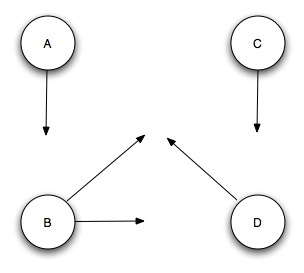4-move rock, paper, scissors!
Contrary to baseless speculation, it turns out it is possible to have a four-player, non-degenerate RPS game. The game below is assymetrical: B does better than others, but you don't want to play it all the time because that makes you vulnerable to A. By contrast, D ain't so hot. But if you never play D, then your opponent can get away with A. It's uneven, but the optimal mixed strategy plays everything with non-zero probability.

Notation: the arrow from A to B means that A beats B. Everyone ties themself. No arrow indicates a tie. There is a tie between A and C. The previous analysis indicated there is no non-degenerate 4-RPS with no ties. This has only 1 tie, so it seems to be the best possible.
(This game is just the previous one with the link from A to C removed. This makes it so B no longer dominates C, since C is now invulnerable from A, unlike B.)

